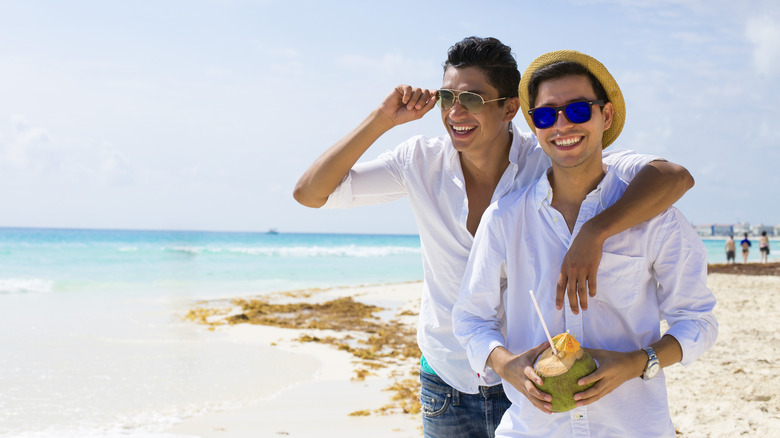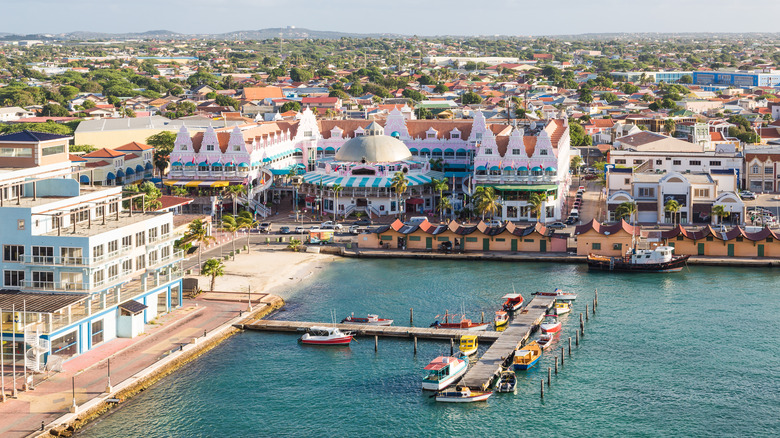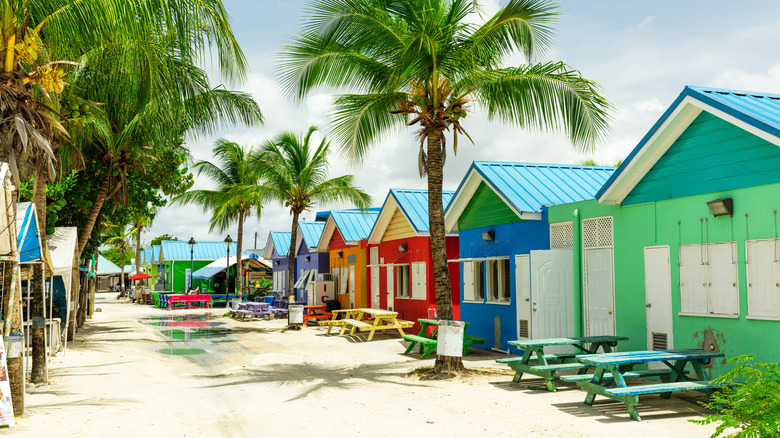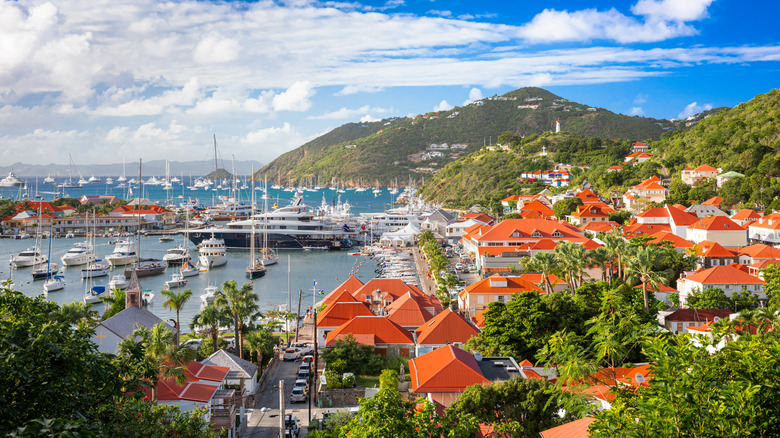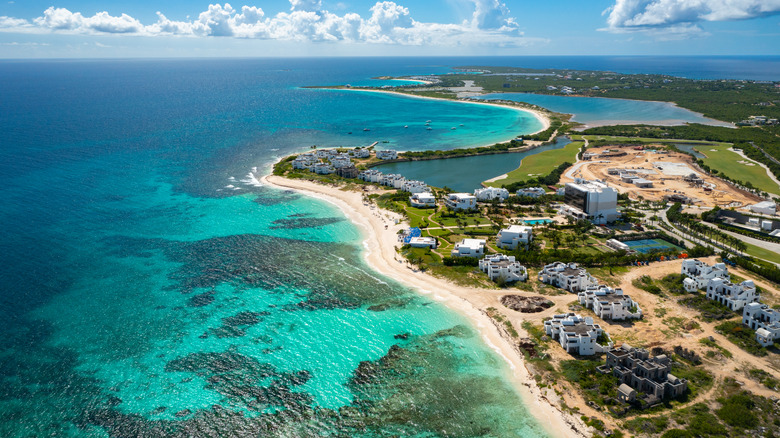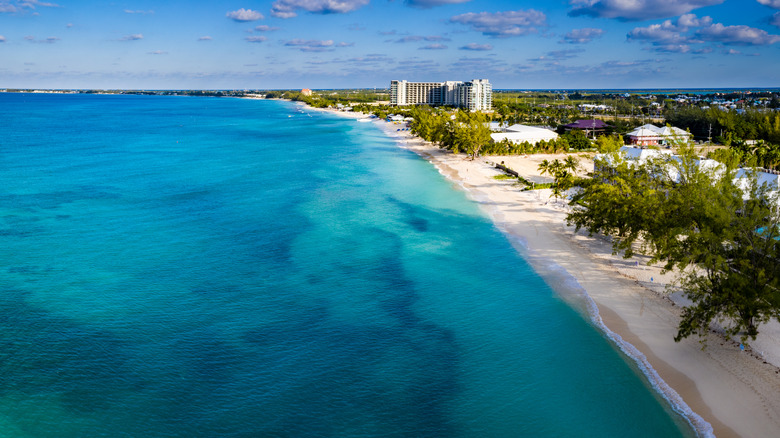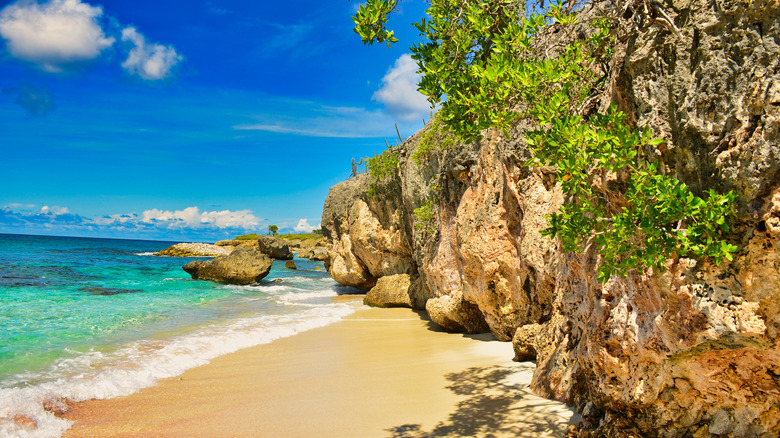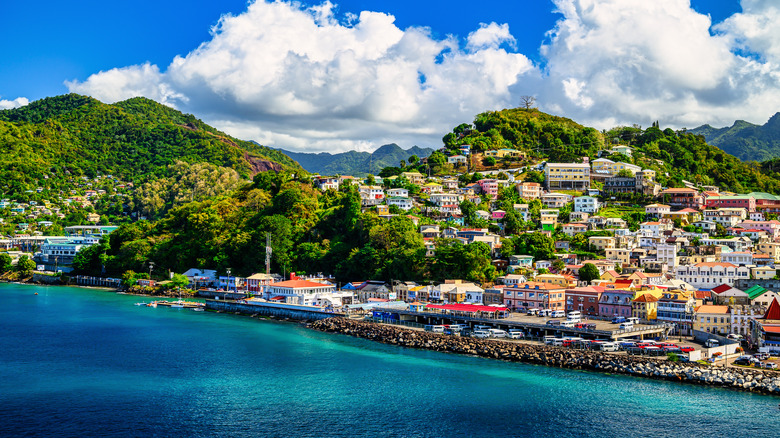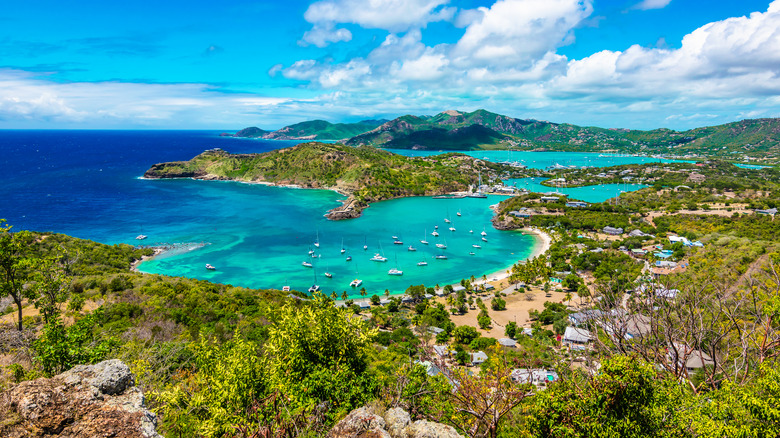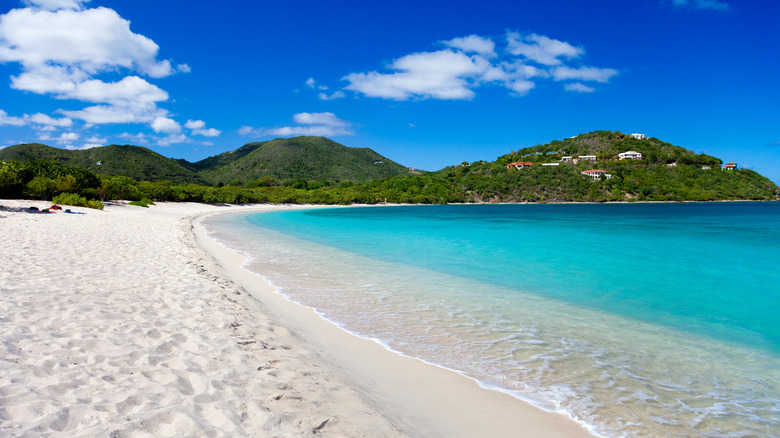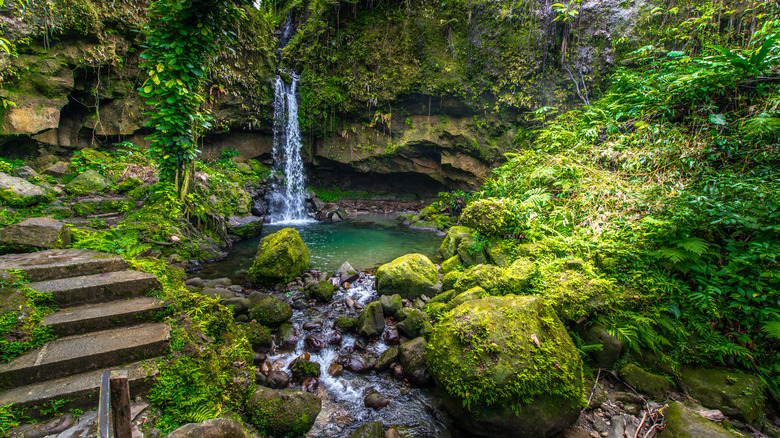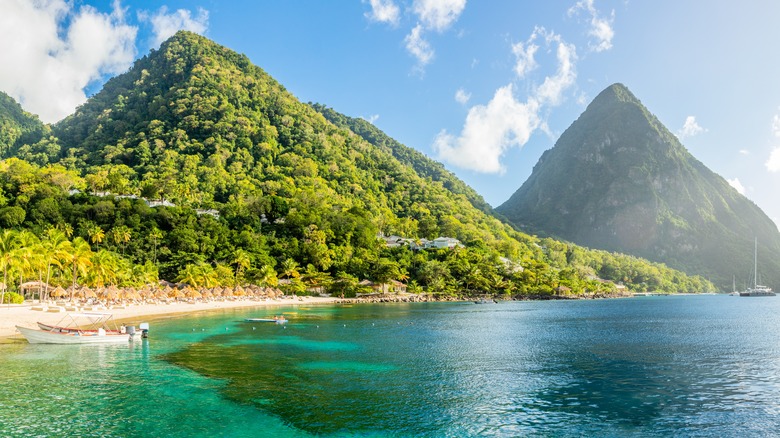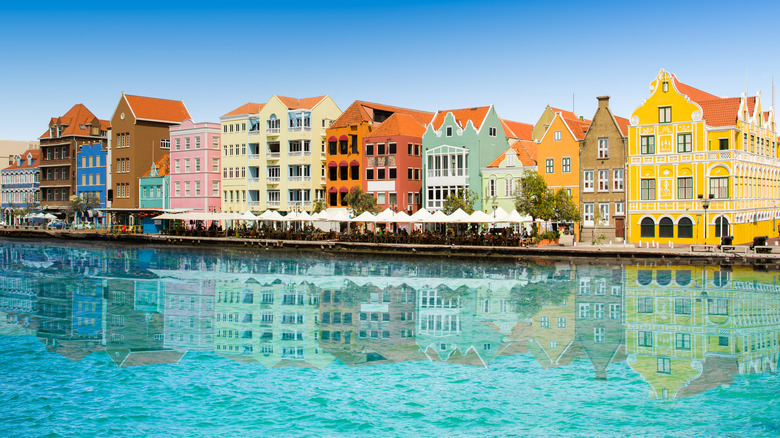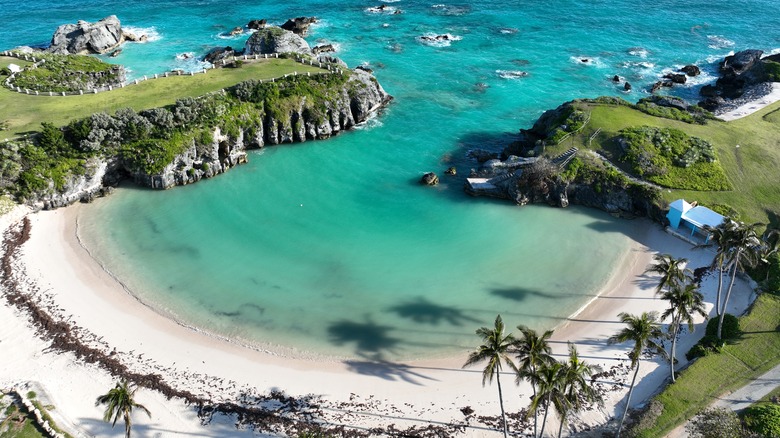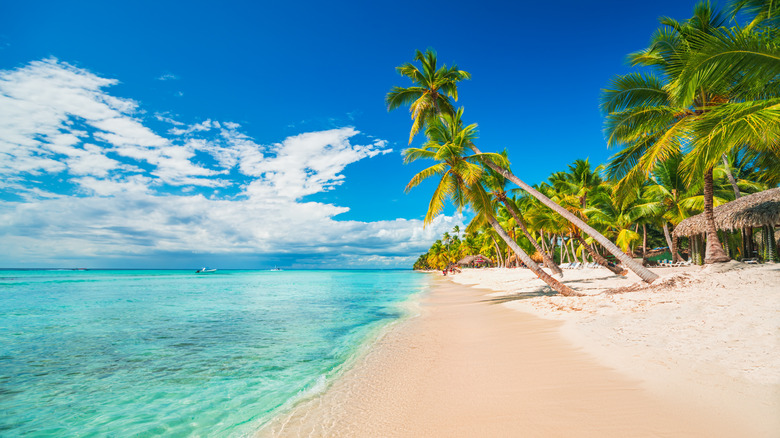14 Safest Caribbean Islands For A Stress-Free Vacation, According To Research
It's no secret that Caribbean destinations like Haiti, Jamaica, and the Bahamas have been designated dangerous places to visit. News outlets across the globe have discussed the U.S. Department of State's high-level travel advisories for these locales. While they may be considered islands non-grata, there are plenty of other equally stunning and safe destinations to enjoy a laid-back holiday in the Caribbean. Whether you're hoping to dine on seafood at an outdoor patio in Aruba, snorkel around coral reefs in Curaçao, or stay in a stunning resort in the Cayman Islands, you'll feel more "ahh" than "argh" when sunning yourself on the Caribbean's safest idyllic isles.
Rest assured that crime, polluted beaches, and shark attacks don't plague the islands on this list. We've combed through crime statistics, official travel advisories, and local tourist and government sites to ensure they're safe to visit. Now, take a load off, slap on some sunblock, and get ready to relax on one of the safest Caribbean islands for a stress-free vacation. One quick tip for a safe and happy holiday: book your travel outside hurricane season (June through November) to reduce your chances of getting stranded (or worse) in a severe storm.
Aruba
Welcome to Aruba, an Elysian island ringed by postcard-perfect beaches and peppered with colorful Dutch colonial buildings. The most unforgettable days end with a spectacular light show staged by Mother Nature herself best watched with a tropical drink in hand. If you're looking for a sensual island to get your romance on, this is it! Aruba is peppered with amorous honeymoon hotels and award-winning all-inclusive resorts for couples primed with luxurious suites and spa treatments, excursions, and more. For example, the plush, adults-only Bucuti & Tara Beach Resort is known for its romantic proclivities. It even has romance concierges to help guests get in the mood.
When you aren't being serenaded on one of the island's most sublime beaches (Eagle Beach is particularly mesmerizing), explore the island's capital city, Oranjestad. This is where you'll find that brightly-painted, Insta-worthy architecture, shops, and myriad restaurants and bars. The idyllic Noord lies on the island's northern coast and is home to multiple hotels, the pristine Palm Beach, and enough stores and eateries to give your wallet (and stomach) a workout.
Safety-wise, Aruba's about as shielded as you can get in terms of crime and natural disasters. The U.S. Department of State gave Aruba its lowest Travel Advisory, a Level 1, recommending travelers "exercise normal precautions" while visiting. Along with Bonaire and Curaçao, which appear later on this list, Aruba sits outside the hurricane belt, meaning it's less likely to experience a major storm during hurricane season (June through November).
Barbados
Barbados is one of the wealthiest islands in the Caribbean, attracting plenty of financial hotshots from across the globe. In addition to the country's spectacular natural offerings like white sand beaches, warm crystalline water, and underground caves, you'll find more advanced perks than those available on other isles. Impressive medical care, plentiful pharmacies, and good roads are modern highlights of the island, most likely due to Barbados' prominent business and investment communities. Its burgeoning tech industry is another plus for those who travel to or live in this beautiful Caribbean nation.
Do you like marine life? Barbados is one of the most breathtaking destinations for swimming with turtles. As if that wasn't enough to entice you to visit, this captivating island is also the birthplace of rum and home to Mount Gay Distilleries. Did someone say, "Cheers?"
There's no need to worry about violent crimes during your vacation to Barbados. The only criminal activity you might experience here is more annoying than dangerous, including crimes of opportunity like pickpocketing. These thefts happen more often during the high season (between November and April). The good news? They're pretty easy to prevent by being vigilant and keeping valuables locked away at the hotel. For the unlucky few who have had their purses snatched, police have been reportedly helpful and kind to tourists.
St. Barts
Bienvenue á Saint-Barthélemy. Better known as St. Barts, this posh French island is only reachable via boat or a small plane. St. Barts is a glamorous highlight of the already alluring French West Indies, a haven for those with bulging wallets and a taste for the good life. This is one of the priciest vacation destinations in the Caribbean. You'll find a low rate of crime that is non-violent in nature (i.e., pickpocketing), friendly locals, high-end restaurants, and designer shops, particularly in the central city of Gustavia.
You may also brush elbows with some of Hollywood's A-listers and the business world's elite. This island is good at keeping your visit a secret if that's something you're concerned about. The beaches on St. Barts are as divine as you'd expect from a luxury isle, featuring calm and shallow water and tranquil surroundings. A stay at the remarkable Eden Rock will set you back over $2,830 a night (per couple), but can you really put a price on five-star service, immaculate accommodations, fabulous food, and stunning vistas?
Anguilla
If you're looking for a quieter, more genuine Caribbean vacation devoid of cruise ship crowds, head to Anguilla. This small island lies in the Lesser Antilles region of the northeastern Caribbean. It welcomes sun worshippers to feel the gentle caress of its warm azure waves as they try to cool off from a day spent frolicking on the sandy white shore. Here, the beaches are the main attraction, with traveler favorites like Shoal Bay, Meads Bay, and Rendezvous Bay Beach ranking highly on lists of the best Anguilla beaches.
While crime is low on this island (hence the Department of State's Level 1 advisory), tourists should still be cautious of pickpocketing and similar misdemeanors. It's also best to be wary, as you would be at any new destination. Do not leave a beverage or meal unattended, and don't accept food or drinks from strangers. According to an interview with David Lynch, the island's Police Commissioner, "most of the minor crimes which occur on Anguilla are family or relationship-focused" (The Anguillan).
Grand Cayman, Cayman Islands
Three main islands comprise the Cayman Islands chain: Grand Cayman, Cayman Brac, and Little Cayman. Beloved for their lively coral reefs, plentiful beaches, and stunning resorts, these isles attracted over 1 million visitors in 2022. Many travelers flock to Grand Cayman's capital, Georgetown, disembarking from their cruise ships to soak up the town's history, grab a bite to eat, sample a tasty drink or two at a local distillery, or head off on an excursion. This island has the region's lowest crime rate, so travelers can feel safe during their visit.
There isn't much dangerous activity on any of the Cayman Islands. According to data collected by The World Bank, the Caymans had only four "intentional murders" for every 100,000 people in 2021. To give you an idea of how low that number is, Jamaica stood at 52 for the same period. Add this statistic to the islands' overall low crime rate, and these are among the safest Caribbean Islands to visit, especially Grand Cayman.
Bonaire
Bonaire is one of the ABC islands (Aruba, Bonaire, and Curaçao) best protected from hurricanes. That's an excellent quality if you plan a trip between June and late November, the riskiest time for major storms. Set outside the hurricane belt, Bonaire's weather is tropical and fabulous, with little rain (under 22 inches yearly) and highs averaging in the upper 80s year round. The climate is ideal for enjoying the island's ethereal pink salt flats and exploring Bonaire National Marine Park's coral reefs and mangroves.
Situated in the Dutch Caribbean, Bonaire is one of the safest Caribbean islands for a stress-free vacation. Crime happens but tends to be petty and non-violent, including pickpocketing and theft from cars and hotel rooms. The country has the lowest Level 1 travel advisory from the Department of State. Another thing that makes this pretty island worthwhile to visit is its purified drinking water.
Grenada
You won't have to watch your back while vacationing in Grenada. With a low crime rate made up mostly of crimes of opportunity like pickpocketing, tourists should be fine if they practice a normal level of precaution (i.e., stowing valuables in a safe). If you're there on a yachting holiday, thefts of cash and outboard engines have been on the uptick on the island's south coast, so lock up, especially at night. Like the Cayman Islands, Grenada experienced only 4 "intentional murders" for every 100,000 people in 2021(via The World Bank), which is a low number. This means you can rest easy while enjoying the impeccable attractions of this blissful destination.
Bring a good camera when visiting the picturesque capital of St. George's. A kaleidoscope of pastel buildings climbs away from the water and up a lush hill, resembling Italy's Amalfi Coast more than a Caribbean town. Tour an ancient fort, buy spices at Market Square, and sample some chocolate while visiting. Next, you'll want to hit the water, where 30 dive sites await on the southern coast alone.
Antigua and Barbuda
Beach lovers unite, and book a holiday to Antigua and Barbuda! Home to a whopping 365 beaches, you could visit one a day for the entire year. A duo of self-governed islands in the Lesser Antilles, this Edenic locale is romantic, laid-back, and filled with fun things to do. For example, you could snorkel with sting rays at the aptly named Stingray City, visit the Antigua Naval Dockyard UNESCO World Heritage site, and sample rum at Anguilla Distillery Limited. This is also a perfect place for a honeymoon.
Safety isn't a big concern for tourists visiting either of these islands or on Redonda, a tiny isle that falls under this country's domain. The U.S. Department of State set a Level 1 travel advisory with minor crimes being the main issue. Bag snatching and pickpocketing can be avoided if travelers keep a close eye on their belongings and leave valuables in a safe place.
Tortola, British Virgin Islands
As its name implies, the British Virgin Islands (a.k.a. BVI) are a Caribbean-based, British Overseas Territory. They are comprised of four main islands (Tortola, Jost Van Dyke, Anegada, and Virgin Gorda) and roughly 50 smaller islands so dreamy that you'll want to swing yourself in a hammock over their sandy shores for hours. Tortola is considered one of the safest Caribbean islands. It's also the largest of the BVIs and home to luxury resorts, beautiful beaches, and myriad things to do, like snorkeling, diving, shopping, and eating at tasty restaurants.
Good news for those traveling to this paradisical archipelago. Criminals aren't purposefully targeting U.S. citizens in this area. While theft is an issue here, as on most Caribbean islands, the crimes tend to be minor, like pickpocketing, purse snatching, and breaking into cars. More violent incidents happen as well, but the Department of State says these types of crimes are rare. That means you'll have plenty of opportunities to enjoy a carefree day and the islands' most exciting attractions and activities.
Dominica
Dominica (officially known as the Commonwealth of Dominica) is a tiny island in the Lesser Antilles. At just 29 miles long and 16 miles at its widest point, this volcanic isle bursts with natural wonders like thermal lakes, hot and cold springs, and lush rainforests. No wonder it's often called "the nature island of the Caribbean." Not to be confused with the Dominican Republic, one of the most dangerous Caribbean destinations, Dominica is a safer, more natural, and relaxing destination than its much larger Caribbean counterpart.
Power outages are the most frustrating thing to worry about on this island. Sometimes, they occur for many hours, multiple times a day. Crime tends to be petty in nature and ramps up in high season, especially during big celebrations like Carnival. That said, more serious robberies and assaults have taken place close to tourist areas. According to the World Bank, there were 14 intentional murders for every 100,000 people in 2021, a relatively low number.
St. Lucia
If you're headed to St. Lucia, it's likely for two main reasons: sun and surf. It's easy to see why so many travelers have chosen this destination, especially those searching for a warm-weather break during winter. Temperatures hover around the mid-80s year-round, and the area sees between 7 and 8 hours of sunshine daily (except when showers hit quickly and sporadically during the wet season from June through November). This Eastern Caribbean island's mountainous landscape, verdant rainforests, and relaxing mud pools at Sulphur Springs are just a few tourist attractions you won't want to miss.
Under the same Level 1 travel advisory given to the other islands on this list, the main safety worries you'll experience (outside of hurricanes) are crimes of opportunity like bag theft during busy festivals and high tourist season. Unfortunately, violent crimes have been on the increase, but this is happening most often in Vieux Fort. Keep valuables hidden, stay in a secure hotel, and don't walk alone in sketchy areas or at night.
Curaçao
Curaçao is a safe place to visit for a tropical island holiday. The "C" of the ABC islands, this pretty Dutch Caribbean isle, lies outside the hurricane belt, so it's less likely to feel the harshest effects of a major storm from June through November. That means you won't be interrupted by gale-force winds while sipping a drink made with the nation's famed blue Curaçao liquor on one of the island's many soft, sandy beaches. Spending time underwater is one of the best things to do in the area, and getting acquainted with Curaçao's best snorkeling spots before booking an excursion is essential.
Soaking up the diverse culture is another must while visiting the region. From unique dishes (ostrich carpaccio, anyone?) to live music to the captivating murals painted on Willemstad's already colorful buildings, there's a lot to love about this safe island. Petty crime is the most common type of illegal activity but isn't prominent in the most populated tourist sections. Another plus is the area's low level of violent crime. Overall, tourists don't need to worry about crime when spending a holiday in Curaçao. That said, be smart when traveling. Don't hang out in secluded places, keep valuables hidden and safe, and opt for a hotel with security to ensure a seamless trip.
Bermuda
Pink sand beaches, turquoise seas, and average highs in the low 70s to mid 80s make Bermuda the perfect place to don its namesake shorts. An archipelago set in the Atlantic Ocean, the seas around this self-governed nation are peppered with shipwrecks, making this a fabulous place to learn to scuba dive like a professional.
The mysterious Bermuda Triangle aside, Bermuda is a fairly safe place to visit. While crime is declining in Bermuda, the incidence of gang violence has increased. That said, this type of activity is not targeted at tourists. It is still at the lowest level, Level 1, in the U.S. Department of State travel advisory. Travelers should be cautious of theft, such as purse snatching, especially at busy tourist sites when vacationing in Bermuda. As you would anywhere, keep valuables locked up in your hotel safe. Also, don't walk alone at night on back streets in Hamilton or on secluded beaches.
Our methodology
We considered multiple facets when deciding which Caribbean destinations to place on our list of the safest Caribbean islands for a stress-free vacation. First, the island had to be safe. Since many destinations have a risk of petty crimes like pickpocketing, it's best to be prepared for this type of activity pretty much everywhere you travel, especially if you're headed to a crowded environment. More violent infractions, however, are a serious cause for concern and something to be avoided.
We researched crime rates for each island, consulting international government information and statistics released by local offices. Only those with low to moderate rates of non-violent crimes were included. Also, each destination had to have the U.S. Department of State's lowest travel advisory, a Level 1, to be deemed worthy. Finally, we consulted information provided by weather experts to ensure that each destination was deemed at least fairly safe from major storms. While it's impossible to promise you won't experience a hurricane or other major weather event, avoiding hurricane season (June through December) will help reduce the risk dramatically.
